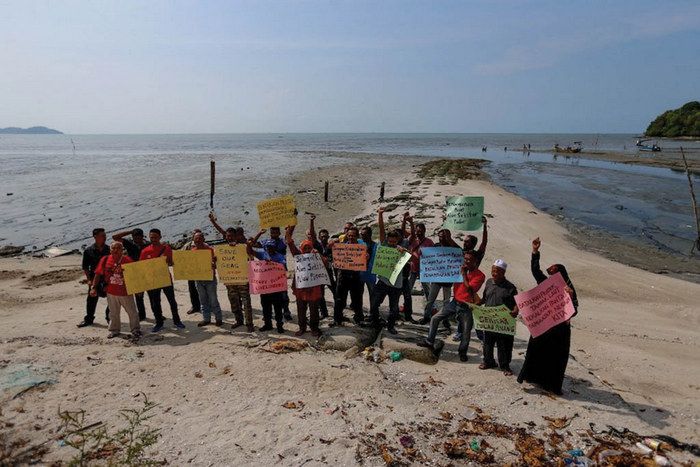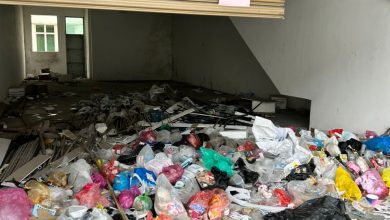Thinking Allowed: Give our fishermen a voice and protect the environment


By Mariam Mokhtar
Sand! Who would have thought that something as innocuous as sand, could be both a source of wealth and corruption. It brings us joy, as we frolic on the beach, but in some parts of the world, sand mining is a reason to kill.
In both Perak and Pulau Pinang (PP), sand is a source of anger, because 189 million cubic metres of it, will be mined, over a 15-year period, to make three artificial islands in the waters off the south coast of Penang.
The Penang South Reclamation Project (PSR) was conceived to boost the economy. Income from selling tranches of the artificial island to developers, to fund the ambitious Penang Transport Master Plan (PTMP). According to some experts, the PTMP is ill-conceived as it is non-sustainable and neglects the environment.
The “Bantah Tambak” protest at parliament, on July 11, by 200 fishermen and their supporters, is not a demand for compensation, or a protest against development. Nor is it about the progress of Perak against that of Penang.
Penang will increase in size by around 4500 hectares, but the state will be beset by fishermen whose livelihoods will be threatened. Moreover, Perak can do without the environmental destruction that is forecast to its shoreline.
In simple terms, the demonstration is about protecting both the rights of the fishermen, in Perak and Penang, safeguarding the environment and protecting the quality of our waters.
Sand is also an international problem. On October 3 last year, prime minister, Dr Mahathir Mohamad, ordered the government to ban all sand exports to Singapore. It was ostensibly to stop illegal smuggling of sand and the involvement of corrupt government officials.
Singapore has expanded its land mass by one quarter since its independence in 1965, by using sand from Indonesia, Malaysia and Cambodia. It is reported that Indonesia has lost vast quantities of coastal sand and around 24 islands because not all of the islands and beaches are patrolled or inhabited.
Some Cambodians have complained that Singapore has been able to extend its territory, whilst they have lost valuable sand and islands to the wealthy island nation. The Cambodians have complained about a reduction in fishing catches. Coastal areas have become prone to flooding and coastal erosion because the protective layer of sand has been stripped by the Singaporeans and transported thousands of miles to Singapore.
In Mumbai, the mafia have killed journalists who report on illegal sand mining.
Some Malaysians may be furious about Singapore’s voracious appetite for sand, but in Perak, many are also angry that the potential effects of mining sand, has not been fully explored. The consequences will have a disastrous effect on the environment and the livelihoods of around 6000 fishermen from Perak, and a further 1800 fishermen from Penang’s Teluk Kumbar and Teluk Bahang.
Few people can imagine that taking sand from one area, and dumping it in another, could be a threat to the environment. They are not aware that sand mining, both legal and illegal, from the sea or river, has the potential to pollute the environment and destroy ecosystems.
Mining sand from the sea can cause shores to become unstable. Erosion of the beach can damage infrastructures, such as roads, bridges and buildings. Trees which line the beach will be uprooted.
As a result of reclamation work near Lumut, the Segari beach in Manjung, which is famed for the turtles, which travel there, to breed. The erosion of the beach may cause the turtles to become extinct.
Sand mining and sand dumping will muddy the waters and destroy ecosystems, which are sensitive to the well-being of shrimp, crabs, shellfish, fish and coral reefs. This is one cause of the drop in the fishermen’s catches.
Dredging the mouth of the river causes loss of shrimp breeding ecosystems, but the effects of sand mining are potentially worse.
The mangrove swamps, especially in Kuala Sepetang and Kuala Kurau are under threat. Mangrove trees provide a natural barrier and protect the lowland areas, from tidal waves, storms, rising sea levels and tsunamis. The loss of mangrove swamps will spell disaster for some coastal areas.
The bird sanctuary at Kuala Gula, in Matang, attracts tourists all over the world. Sand mining could threaten eco-tourism in Kuala Sepetang.
Sand mining affects ecosystems. This will affect those who have invested heavily in aquaculture and mariculture projects.
Sand mining will expose rocks on the seafloor. Fishermen have suffered the destruction of their nets and boats, in Penang. Repairs are costly.
Dredging and sand mining may release heavy metals, which are trapped in the sea and estuary beds. These could affect our health.
Before the project is approved, a detailed and comprehensive study on mining of sea sand should be carried out by universities, and be independent of the property developers.
As the sand from the seas off Perak will be mined for the PSR project, the Perak Menteri Besar (MB), Ahmad Faizal Azumu, should heed the potential threat to the environment, and review its impact on the state. For example, the loss of income for the fishermen, & the aqua- and mariculture businesses which bring in substantial revenue for the state.
If the MB does not seize the opportunity to act, the fishermen will lose their source of income and their way of life. In the near future, our children and grandchildren will bear the consequences of our environmental pollution and the hike in prices of fish and seafood will be nothing in comparison with the threat to our part of the world.
Sources: https://www.youtube.com/watch?v=ySzBpkYYUqQ How Sand Mining Destroys One Home to Build Another | Short Film Showcase Impact of sand mining | Sumaira Abdulali | TEDxXIE Fishermen protest against STP2 at sea Persatuan2 nelayan negeri Perak dan Pulau Pinang KUASA Penang Forum

